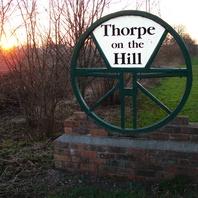
Viking Names
Thorpe on the Hill
Thorpe on the Hill, in the Graffoe Wapentake of Lincolnshire, is a simplex place-name coming from Old Norse þorp ‘a secondary settlement, a dependent outlying farmstead or hamlet’. The affix is self-explanatory.
Read More
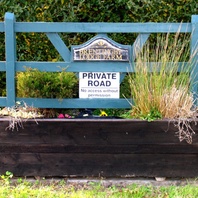
Viking Names
Brentingby
Brentingby, in the Framland Hundred of Leicestershire, is a difficult place-name that presents several problems. It is potentially an Anglo-Scandinavian hybrid from the Old English male personal name Branting or Brenting combined with Old Norse by ‘a farmland, a village’. Alternatively the name could be ‘the by of Brant’s people’ with the Old English –ingas ‘people of’ place-name forming element. However, an Old English folk-name combined with Old Norse by is unusual. Another suggestion is that an early Old English place-name Branting/Brenting, from Old English brant ‘steep’ and the place-name forming suffix –ing, was later compounded with Old Norse by thus ‘the farmstead, village at Branting (‘the steep place’)’. Brentingby stands on a steep slope above the flood-plain of the River Eye.
Read More
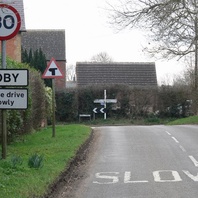
Viking Names
Hoby
Hoby, in the East Goscote Hundred of Leicestershire, is an Anglo-Scandinavian hybrid name from Old English hoh ‘a heel; a sharply projecting piece of ground’ and Old Norse by ‘A farmstead, a village’. The name is topographically appropriate because the present village sits at the foot of a great spur of land which abuts the River Wreake. Hoby is now a joint parish with Rotherby.
Read More
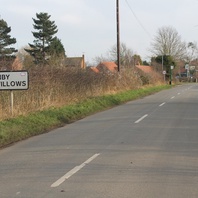
Viking Names
Barnby in the Willows
Barnby in the Willows, in the Newark Wapentake of Nottinghamshire, most likely comes from the Old Norse elements barn ‘child’ and by ‘farm, settlement’. Its meaning, ‘farmstead of the children’, may indicate joint inheritance by the offspring. Alternatively, the first element of the name could come from the Old Danish male personal name Barni. The affix is added at a later date and means ‘among the willow-trees’ and could be connected to its low location by the river Witham. The place-name has the same etymology as Barnby Moor, in the Bassetlaw Wapentake of Nottinghamshire.
Read More
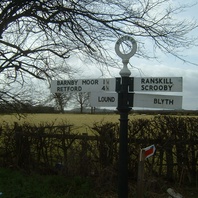
Viking Names
Ranskill
Ranskill, in the Bassetlaw Wapentake of Nottinghamshire, probably comes from the Old Norse male personal name Hrafn (which is also the word for ‘raven’) and the Old Norse element skjalf ‘seat, ledge, slope’. It is on a slight slope above the level ground.
Read More

Viking Names
Holme
Holme, in the Thurgarton Wapentake of Nottinghamshire, is a simplex name from Old Norse holmr ‘an island, an inland promontory, raised ground in marsh, a river-meadow’. This place is by the River Trent, and there are several other places by this name in the county. For more information about Holme and other place-names in the East Midlands, see the Lunchtime Talk Holme from Home? East Midland Place-Names and the Story of Viking Settlement.
Read More

Viking Names
Snelland
The derivation of Snelland, in the Wraggoe Wapentake of Lincolnshire, is uncertain. The first element is either the Old Norse male personal name Snjallr or the Old English male personal name Snell, the second element is Old Norse lundr ‘a small wood’.
Read More
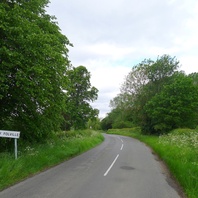
Viking Names
Ashby Folville
Ashby Folville, in the East Goscote Hundred of Leicestershire, is likely an Anglo-Scandinavian name coming from Old English æsc ‘ash-tree’ and Old Norse by ‘a farmstead, a village’. Some spellings may show influence of Old Norse eski ‘a place growing with ash-trees’ or even Old English esce ‘a stand of ash-trees’ on the first element. The suffix Folville comes from the de Folevill family who held the manor from the mid twelfth century until at least 1368.
Read More
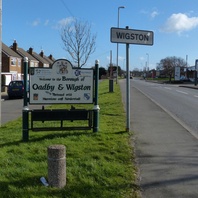
Viking Names
Oadby
Oadby, in the Guthlaxton Hundred of Leicestershire, likely comes from the Old Norse male personal name Auði (Old Danish Øthi) which appears as Owði in the Liber Vitate of Thorney Abbey. A potential alternative for the first element is Old Norse auðr ‘wealth, riches’, which might refer to the easily worked and fertile glacial sand and gravel on which Oadby lies. The second element of the place-name is Old Norse by ‘farm, settlement’. It is now a joint village with Wigston Magna.
Read More
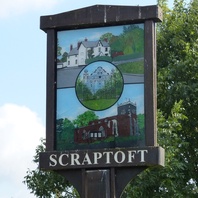
Viking Names
Scraptoft
There are two possibilities for the first element of Scraptoft, in the Gartree Hundred of Leicestershire. The first suggestion is that it is the Old Norse male personal name Skrápi (genitive singular Skrápa). Alternatively, the specific could be the Old Norse element skrap ‘scraps, scrapings’ potentially referring to arid barren soil which may be related to Modern Norwegian skrapmark ‘land thinly covered by grass’. This would be topographically appropriate as the settlement lies on a small area of sand and gravel on top of boulder clay. The second element of the name is Old Norse toft ‘building plot, homestead, curtilage’.
Read More
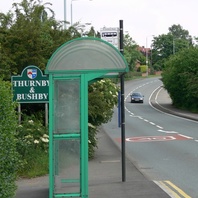
Viking Names
Thurnby
Thurnby, in the Gartree Hundred of Leicestershire, probably derives from Old Norse þyrne, þyrnir, þyrni ‘a thorn-bush’ and Old Norse by ‘a farmstead, a village’. It is also possible that the specific element is the Old Norse byname Þyrnir. However, when taken with the neighbouring parish Bushby these names appear to record an area of former scrubland. This land remained poorly exploited until the period of Scandinavian settlement. Some earlier spellings of the name show substitution of Old English þorn ‘a thorn-tree’ as the first element. Thurnby is now a joint parish with Bushby.
